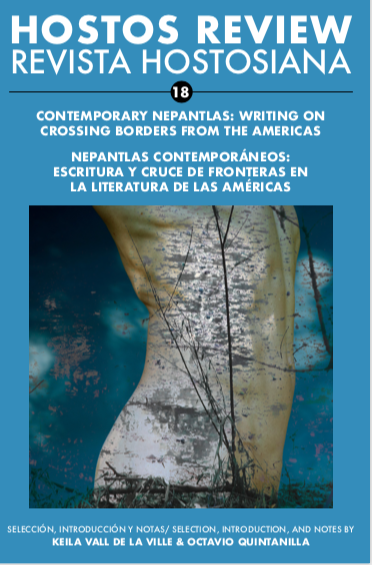In a year marked by the immigration wave from Texas to New York, the Latin American Writers Institute at Hostos Community College in Mott Haven dedicated its latest edition of the Revista Hostosiana to writings about immigration and border crossing.
The 18th edition of the journal compiles writings in English, Spanish and a combination of languages, including Spanglish, Portuñol, Portuguese, and French.
“We are a community of border crossers here at Hostos,” said Inmaculada Lara-Bonilla, chief editor of the journal. She is an associate professor of Latin American and Latinx Literature and Cultural Studies at Hostos, NYC’s only public bilingual college.
Lara-Bonilla, who took over as chief editor in 2018, said she noticed that previous themes were geographical-based and she wanted to change the themes to include a larger pool of writers.
“I noticed [the journal] respected a lot of borders and I wanted to do away with borders,” Lara-Bonilla said. “I’m very interested in this concept of being in between.”
At the launch event for the journal’s latest edition, Santiago Vaquera-Vasquez, a professor at the University of New Mexico and self-proclaimed border-crosser, invited people to wonder what the “cultural consequences of crossing the border” are, since the selected works focus on the feeling of not belonging to the place they left, nor the one where they are now.
“[The journal] is a document of days of crossing,” he said
Guest editor and Venezuelan writer Keila Vall de la Ville, who now lives in Manhattan and designed the journal’s cover image, said the writings selected are “about experiences like exile, refuge, foreign and not belonging.”
Violette Bule, a conceptual artist based at the University of Houston, expressed her struggle with identity and sense of belonging because she left her native country and has lived in many places. She mentioned that she was unable to see her grandfather for six years because she lacked a document, and then he died from COViD-19.
“We’ll never be from here and we never were from there. I am a Venezuelan in Diáspora”” she wrote. She read an excerpt of her poem Ser para otros, which means To be for others.
Lara-Bonilla received permission to print unpublished work of deceased writer Gloria Anzalduá, including “A Crosser of Borders,” where Anzalduá talked about her upbringing as a lesbian Chicana in South Texas, and her rejection to borders. The Anglo and Mexican cultures, she said, had “set ideas” of what a woman like her was supposed to be. The audience members were invited to open themselves to new ideas.
“We rarely listen,” Anzaludua wrote. “We’re so busy to put forth or defend our ideology that we don’t open ourselves up to what the other person is saying –to feel the other person’s presence.”
The journal is one of only a few published in a combination of languages, consonant with the Institute’s mission to create a bridge between white writers and others and inspire non-Latino readers to expose themselves to literature outside their culture, and vice versa.
“There aren’t enough mediums that allows a world to enter another,” Lara-Bonilla said.
All editions of the journal are available online at LAWI’s website along with instructions on how to obtain a hard copy of it. Revista Hostosiana was featured at a conference this month at the University of Texas.

